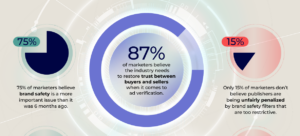NDA has always been dedicated to celebrating the digital industry and as the pandemic took hold we launched our Reasons to be Cheerful series. As we face an uncertain economic future, we’ll be hearing from leaders across our industry to discover what’s keeping them smiling as we enter 2023. Next up is Ben Hookway, CEO and Co-Founder, Relative Insight.
What are you most excited about in the digital industry in 2023?
We are entering a period in which the mass adoption of digital transformation during the pandemic will really start to enable new opportunities for companies. It’s been well documented that some industries had to undertake three years of digital transformation in three weeks to keep their companies running during the pandemic.
That was a real catalyst for change, and I think that there will be another acceleration in innovation as companies now fully understand what innovations in their processes and analytics can do for them.
Why are you most positive for your business in 2023?
Technologies often have a clear adoption path. From a feature, to a tool, to a platform that solves big strategic problems. We are definitely seeing text analytics entering the platform stage in 2023 whereby it is used to solve critical business problems.
It’s not about showing word clouds anymore. It’s used, for example, to understand the changes in the way customers are reviewing products or services so you can double down on strengths or quickly address weaknesses.
How will the digital industry, and your company, help make life better for consumers or partners in 2023?
Our focus is understanding text. Understanding how people talk and write is so valuable because it explains the ‘why’: Why we feel like we do, why we hold that point of view, why we are trying to get you to change your mind. Right now most companies only understand the ‘what’ at scale: What you complained about, what rating you gave our service, and so on.
If we can bring the at scale understanding of the ‘why’ we will all feel more engaged with and listened to and have the ability to fully express ourselves without having to be confined to a score out of ten.
What technologies have you been most impressed with this year and which will have the most impact in 2023?
I don’t know if this will have an impact in 2023 but I do alway love to follow the non-glamourous innovations.
Battery technology is a key one for me. If you increase battery technology, it opens up a much better world from electric cars to longer charges on phones, to rapid charging times. Solid state battery technology is really coming on and I expect to see the implications of that coming through soon. It’s usually the stuff you never think of that affects your life the most!
What, if any, positive impacts on the digital industry could an economic downturn have?
When times are good, what tends to happen is that industries coalesce around conventional wisdom; and end up doing something a certain way. In tough times, you may need to come at a problem from a completely different perspective – just as many did during the pandemic.
I’ve spent my whole career looking at cool tech and thinking of new applications. With judicious use of the right technology – combined with human talent, energy and determination – companies can innovate themselves out of a crisis.
However, today, when you ask somebody on the board, or at C level, to outline their primary sources of business intelligence and which data sources they monitor, 99% will give quantitative answers, such as web traffic, revenue and profit. The challenges we are facing now may force more of a focus on insights.
I’m optimistic that the all-important text-based ‘why’ sources of data will start to come to the fore, rather than relying solely on the ‘what’. This would herald a massive, fundamental shift in how companies look at their data and think about the value they can get out of it. This shift would be hugely positive for the industry, and we’re starting to see it happening right now.
Most organisations have vast amounts of text data that they aren’t taking advantage of – the likes of customer service transcripts, open-ended survey responses, reviews and social media. It’s perceived to be harder to organise and analyse than quantitative data. But herein lies a treasure trove of insights and thanks to technologies such as natural language processing – a form of AI – it is possible to do this well, and fast.












